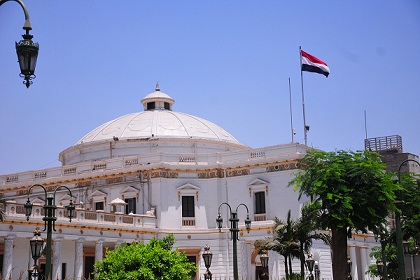
So it is finally out. The date is finally set, the wheels are in motion and things are happening for the post 30 June ruling coalition. The very first product has been finalised and is merely being marketed at the moment. In fact, the idea of being able to deliver what has been promised in time seems to be a cause for celebration, a lot more than the essence of what has been delivered. There is a strange resonance to the idea of being able to deliver here in Egypt – regardless of what you deliver. And yes, the coalition was able to deliver; it was able to win different kinds of battles until its first child came through.
During the four days from 30 June to 3 July there was a unique consensus in Egypt on the absolute necessity of removing Mohamed Morsi and the Muslim Brotherhood from office since they were a serious threat to the stability and security of this country. Despite any involvement from the deep state in organising or mobilising for 30 June, those four days were a true reflection of real Egyptian national solidarity against the corrupt leadership of the Muslim Brotherhood. However, everything that came afterwards never saw the same magnitude of consensus. The direction we went and the policies we adopted were not the choice of the millions who took to the streets challenging Morsi and the Brotherhood for four days, they were specifically the choice of the elite that was created after those four days were over. And the constitution is the first tangible product this elite introduces.
There is an obvious obsession so common among the supporters of the constitution, and that’s reaching a higher participation rate than the Muslim Brotherhood’s 33 percent, and passing the constitution with a higher “yes” vote than Morsi’s 64 percent back in the 2012 referendum. But the concerns behind that obsession are quite understandable. The high participation rate and the impressive majority vote are considered to be the very basic pillars upon which the new regime along with its new elite will be based. Therefore, for the June coalition and its major supporters (the army, the police and the judiciary) the constitution is much more than a political document, and the referendum is much more than a political process. The constitution and the referendum are a very first step in a massive political build-up, one that aims to restructure the state-citizen relationship, and consolidate the powers of the Egyptian state’s institutional core.
But the document itself is not that bad. Giving an honest objective opinion about the constitution is not an easy job to do. On one hand, the constitution does include articles that we as Egyptians have always dreamed of. But on the other hand, the very same problems we have always suffered from are still present in that new constitution.
The specifics are not really important right now, there must be at least ten research papers and historical comparisons between the new and the old constitutions available at different think tanks and political research centers. Those who are interested in going the process article for an article could easily do so. But general perspectives are quite clear. In general, the constitution does provide a higher ceiling of rights and freedoms, without real tangible guarantees. It leaves a lot of matters to be regulated by the law afterwards, which naturally leaves the principles preached by the constitution to be a function of the legislative council present. No doubt it mentions minorities like women, Copts and Nubians, but it does not specify what exactly the “proper representation” it promises those minorities is. It respectfully raises the public expenditure on health care, education and research, but again without specifying where this extra cash will come from or what it will affect. Finally, there is an enormous room left for the three core institutions the military, the police and the judiciary; room that will always reflect the balance of powers in Egypt while this constitution was being drafted.
The truth is, the new constitution has been passed long ago. The referendum is merely a procedural necessity, but its outcome is not even prone to doubt. The dimensions of the new regime have already been envisioned, the institutions that shall retain power have already been selected and the individuals that will constitute the “elite” have already been chosen. The referendum is really the gift package these political efforts were wrapped in.
However, what the West does not seem to understand so far is that the conflict is no longer a military-brotherhood one, neither is it a question of democracy and equality, it is really a strictly local Egyptian political battle between the traditional forces that have always been there; and its outcome is a matter of resources rather than one of actual change.
The referendum is really just a petty challenge that the current regime will be able to comfortably win.
Ziad A. Akl is a political analyst & a sociologist. He is a senior researcher at the Egyptian Studies Unit at Al-Ahram Center for Political and Strategic Studies.




